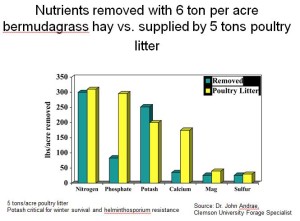Need Potash With Your Poultry Litter?
If there was ever a year that demonstrated the need for proper potassium fertility in bermudagrass, 2013 was that year. We had plentiful summer rainfall (maybe too much), high humidity, and leaf spot around every corner. If you haven’t already started, 2014 will be the year to get our fertility situation in order.
There are many farmers relying on poultry litter for their primary source of fertility. Poultry litter is a fantastic alternative fertilizer, so don’t think I’m not in favor of using it if you have the opportunity. However, as good as poultry litter is, it may not meet the potassium requirement of highly productive bermudagrass fields. When reviewing the fertility status of bermudagrass fields with productivity issues, low or marginal potassium level is often a problem. Farmers using poultry litter are often surprised that they must buy potash.
The chart below shows the amount of nutrients removed from bermudagrass fields yielding 6 tons per acre per year compared to the plant nutrients applied in 5 tons of poultry litter. As you can see, we are removing more potassium than is being applied. It is critical that farmers using poultry litter monitor soil potassium levels by frequent soil samples from these fields.
Nutrient content of poultry litter varies between species (chicken vs. turkey), type of operation (breeder vs. brooder vs. grower), and from farm to farm. Knowing the nutrient content of the litter being applied is required for calculating the amount of potassium applied. The amount applied can be compared to the recommendations from soil tests to determine if there is a potassium deficit. Potash can be applied to make up the difference.
South Carolina regulations require yearly litter analysis from poultry farms AND yearly soil samples from fields receiving litter. It is a good management practice to sample soil and litter, even if analysis isn’t required in your state. Use these test results to assure adequate fertility is being applied to bermudagrass hay fields. This will help get optimal production and stand longevity from our bermudagrass.
More information on proper bermudagrass fertility can be found by clicking here.


Excellent piece. So true!